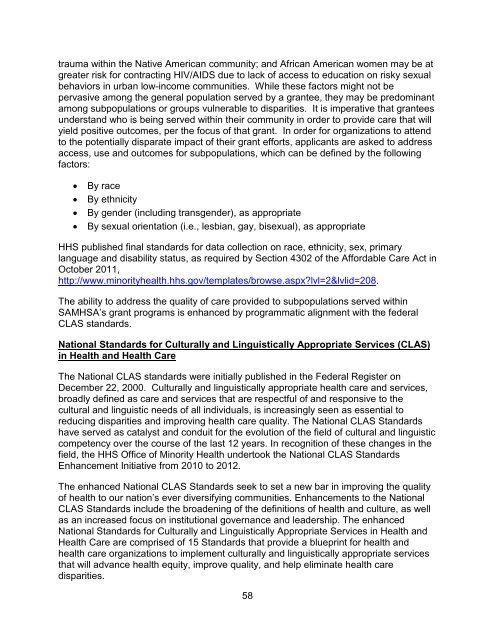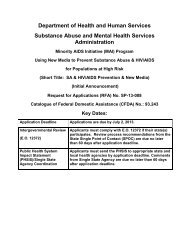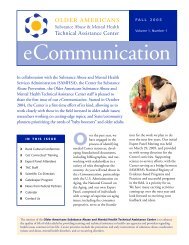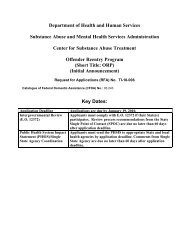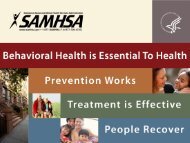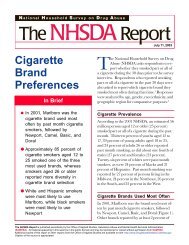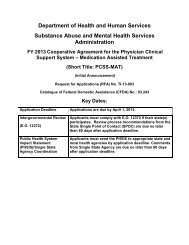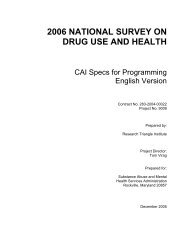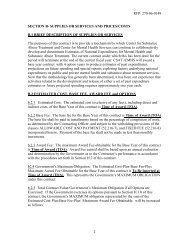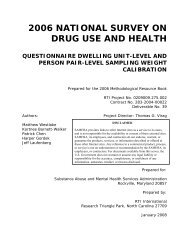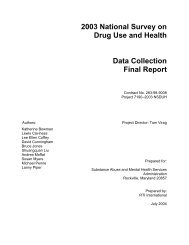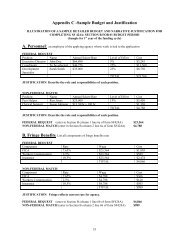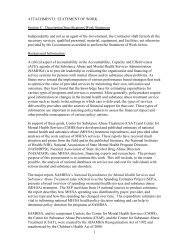Download Complete RFA Announcement (PDF | 351 KB)
Download Complete RFA Announcement (PDF | 351 KB)
Download Complete RFA Announcement (PDF | 351 KB)
Create successful ePaper yourself
Turn your PDF publications into a flip-book with our unique Google optimized e-Paper software.
trauma within the Native American community; and African American women may be at<br />
greater risk for contracting HIV/AIDS due to lack of access to education on risky sexual<br />
behaviors in urban low-income communities. While these factors might not be<br />
pervasive among the general population served by a grantee, they may be predominant<br />
among subpopulations or groups vulnerable to disparities. It is imperative that grantees<br />
understand who is being served within their community in order to provide care that will<br />
yield positive outcomes, per the focus of that grant. In order for organizations to attend<br />
to the potentially disparate impact of their grant efforts, applicants are asked to address<br />
access, use and outcomes for subpopulations, which can be defined by the following<br />
factors:<br />
• By race<br />
• By ethnicity<br />
• By gender (including transgender), as appropriate<br />
• By sexual orientation (i.e., lesbian, gay, bisexual), as appropriate<br />
HHS published final standards for data collection on race, ethnicity, sex, primary<br />
language and disability status, as required by Section 4302 of the Affordable Care Act in<br />
October 2011,<br />
http://www.minorityhealth.hhs.gov/templates/browse.aspx?lvl=2&lvlid=208.<br />
The ability to address the quality of care provided to subpopulations served within<br />
SAMHSA’s grant programs is enhanced by programmatic alignment with the federal<br />
CLAS standards.<br />
National Standards for Culturally and Linguistically Appropriate Services (CLAS)<br />
in Health and Health Care<br />
The National CLAS standards were initially published in the Federal Register on<br />
December 22, 2000. Culturally and linguistically appropriate health care and services,<br />
broadly defined as care and services that are respectful of and responsive to the<br />
cultural and linguistic needs of all individuals, is increasingly seen as essential to<br />
reducing disparities and improving health care quality. The National CLAS Standards<br />
have served as catalyst and conduit for the evolution of the field of cultural and linguistic<br />
competency over the course of the last 12 years. In recognition of these changes in the<br />
field, the HHS Office of Minority Health undertook the National CLAS Standards<br />
Enhancement Initiative from 2010 to 2012.<br />
The enhanced National CLAS Standards seek to set a new bar in improving the quality<br />
of health to our nation’s ever diversifying communities. Enhancements to the National<br />
CLAS Standards include the broadening of the definitions of health and culture, as well<br />
as an increased focus on institutional governance and leadership. The enhanced<br />
National Standards for Culturally and Linguistically Appropriate Services in Health and<br />
Health Care are comprised of 15 Standards that provide a blueprint for health and<br />
health care organizations to implement culturally and linguistically appropriate services<br />
that will advance health equity, improve quality, and help eliminate health care<br />
disparities.<br />
58


